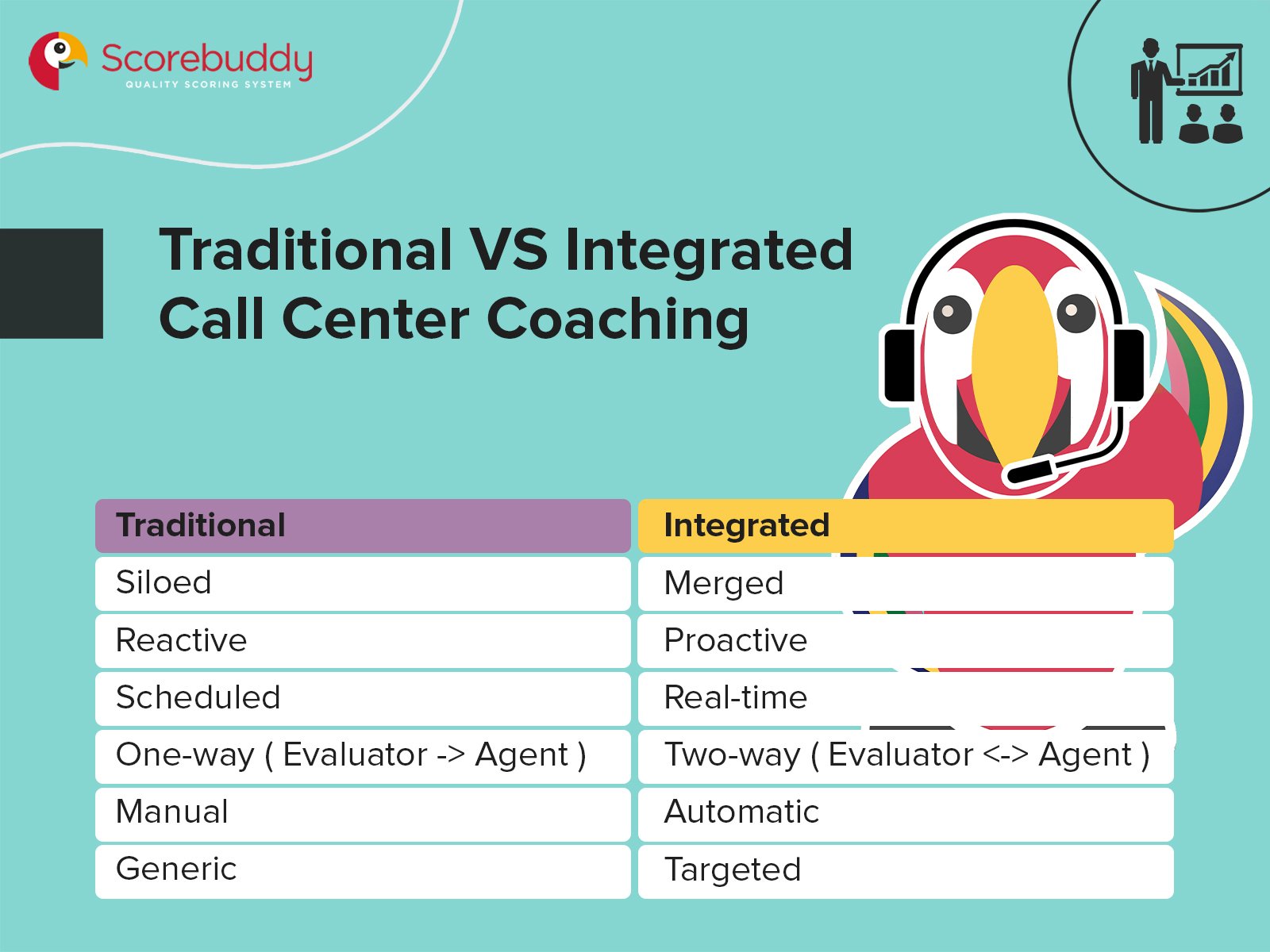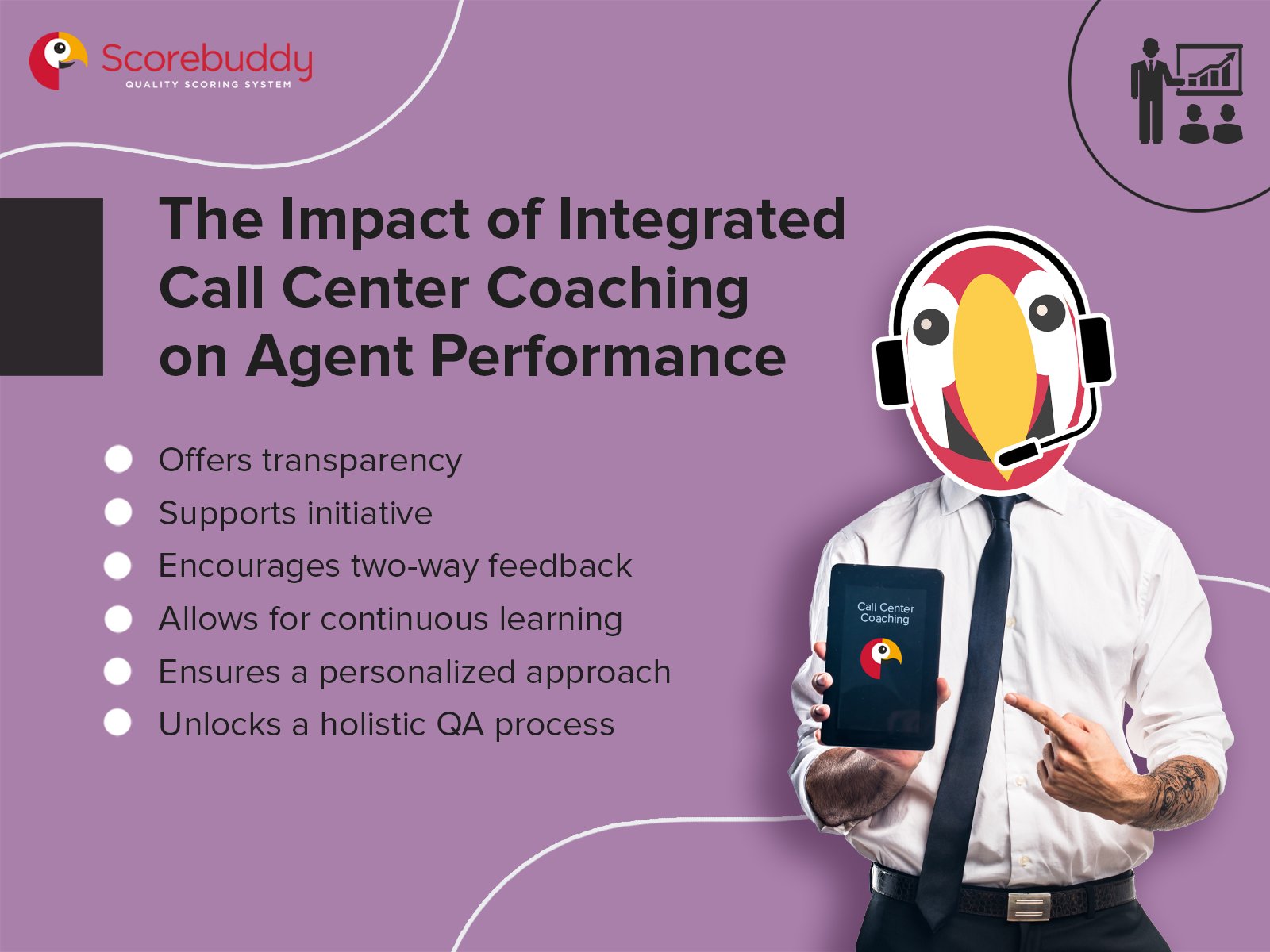Swapping traditional coaching methods for integrated call center coaching brings a wide range of benefits, including improved performance, better customer service, and, perhaps most importantly, increased agent engagement.
With research finding that only one in three customer service reps are engaged in their work, it’s vital that call center leaders find a way to tackle this apathy and get their employees invested in the job. Failure to do so could lead to poor CX, weak KPIs, and high attrition.
Let’s look at the ways you can leverage integrated call center coaching to boost your agent engagement and beat churn.
Call center coaching is a key feature of an effective quality assurance process. Supervisors use coaching to train new agents and upskill existing ones through one-to-one sessions, interactive courses, video tutorials, and more, with the aim of improving customer service.
While supervisors also conduct performance reviews as part of the quality monitoring process, coaching is a more actionable activity. Beyond identifying weaknesses, it is about giving agents the tools they need to learn from their mistakes and grow in the role.
While traditional and integrated call center coaching share the same core aims—better agent performance, improved CSAT scores, increased productivity—they differ in their approach. Let’s look at the main differences between the methods.
With integrated coaching, everything is integrated into your existing workflow and call center infrastructure. No more jumping between screens or transferring data from platform to platform—all your QA and coaching information is in one place. This enables you to establish standardized coaching workflows instead of ad hoc sessions for a more consistent coaching experience.
As the old saying goes, “prevention is better than cure.” This holds true for coaching, too. It’s always better to proactively identify potential issues by analyzing QA data than waiting for something to go wrong and trying to fix it. With an integrated approach, you can develop a strategy that tackles issues before they can escalate, saving time and effort in the long run.
Integrated call center coaching has a much more immediate impact on your agents. Rather than waiting for the next session, you can give feedback right away and deal with problems while they’re still fresh. Some AI-powered solutions even use sentiment analysis and speech analytics to anticipate customer needs and offer live guidance during interactions.
Typically, a traditional coaching approach is based on evaluators and supervisors delivering information to agents. There’s not much by way of back-and-forth, collaborative discussions. An integrated approach to call center coaching, on the other hand, encourages agent feedback, two-way discussions, and an overall more transparent process based on trust.
Integrated coaching tools for your call center offer both extensive customization and quick-setup options to get you started right away. With built-in templates and streamlined workflows, you can skip time-consuming manual tasks, like moving data from platform to platform, and get stuck into the actual coaching sessions instead.
With integrated call center coaching, you can analyze your QA data to develop targeted coaching sessions linked to real-world interactions and behaviors. For example, if you found that first call resolution was below target for calls about a new piece of QA software, you could focus upcoming coaching sessions on improving agent knowledge of this new product.

Making the upgrade to integrated call center coaching can have a big impact on agent performance, customer experience, operational efficiency, and more. Let’s look at the key advantages of the integrated method.
With every tool in one place, you can streamline the entire QA process, including coaching, from start to finish. No more screen-hopping or pulling data from ten different spreadsheets, it’s all there on one purpose-built platform. This is key to quickly preparing and delivering coaching sessions and improving operational efficiency.
Much of the coaching workload comes down to excessive prep time. In fact, for 34 minutes of actual coaching, managers spend an average of two to three hours preparing. Integrated call center coaching offers automated processes, ready-made templates, and simplified admin so you can work smarter and spend more time actually coaching agents.
With an integrated approach, you can analyze QA data and deliver coaching on one platform, establishing a clear link between the two. This way, you can develop a coaching strategy that is relevant to your specific business aims and have clear visibility into agent progress and the impact of coaching on KPIs.
Merging quality assurance and coaching is essential to delivering the most effective coaching sessions. With all agent performance data at your fingertips, you can easily identify problem areas and make improvements where it matters. This ensures that you’re hitting specific weak points for each individual agent and not just adopting a blanket approach.
In call centers, agents often get stressed, stop engaging, and eventually, they quit. The main cause of disengagement is a lack of role and goal clarity. Integrated coaching tackles this, with personalized training plans giving each call center agent a clear sense of purpose. In fact, 94 percent of employees say they would stay longer if a company invested in their career.
Better coaching means stronger CX and higher scores for KPIs like customer satisfaction score (CSAT) and Net Promoter Score (NPS). With an integrated strategy, you’re analyzing data from real interactions to develop your coaching plans, so you can be sure that you’re targeting agent weak spots and improving in the areas that actually matter to customers.
Many of the benefits mentioned above feed into revenue generation. If your CX improves, for example, then you’ll build up a base of happy, loyal customers who are willing to stick around and spend more money. In fact, 72 percent of customers say they would spend more with a brand that offers exceptional CX. Integrated coaching can get you there.
With over half of CX leaders citing recruiting and retaining talent as their biggest challenge, anything you can do to keep agents engaged could prove a valuable competitive differentiator. Integrated call center coaching provides a framework that boosts both agent engagement and performance, two essential components of long-term success. Let’s see how.
The integrated model fosters an honest approach to coaching, based on clarity and transparency. Coaching is no longer a directive handed down from above. Instead, agents are given a chance to understand the purpose behind a session and the desired outcome.
You can use tools like personalized agent dashboards to let employees track their progress and the impact of the coaching process on both their individual metrics and wider company KPIs. This showcases the value of coaching and establishes trust in the process.
Coaching isn’t about telling agents what they’re doing wrong and correcting them on the spot. It’s about providing them with opportunities to recognize their own weaknesses, reflect on their performance, and take practical steps to improve.
By assigning follow-up tasks and learning materials after each coaching session, you can encourage employees to act on their own initiative. With integrated coaching, you can even deliver these materials within their existing interface and turn idle time into learning time.
The integrated model means that coaching is no longer a one-way street. By leveraging both positive and negative feedback—in both directions—you can cultivate a back-and-forth dynamic that encourages learning and development for agents and supervisors.
Inviting agents to ask questions, not only about their own performance but also about your coaching strategy, helps to keep them invested in the process. If they see that coaching can be collaborative, they’re more likely to stay engaged.
Nearly two-thirds of customer service agents want ongoing call center training, and it takes 4 coaching sessions for them to implement a new skill. With these numbers in mind, it’s clear that continuous learning is important for both engagement and performance.
Integrated coaching tools allow you to assign follow-up tasks, provide additional learning materials, and track agent progress so you can reinforce the idea that learning is a daily practice beyond individual coaching sessions.
To keep agents invested in the coaching process, you need to make it relevant. With integrated coaching, you can leverage detailed QA insights to link your training plans to real-world agent behaviors.
If your sessions include tangible examples from real customer interactions, you can show your agents that coaching is relevant to their day-to-day work. Not only does this make the sessions more engaging, but it also empowers agents to take control of their development.
Adding integrated coaching to your existing QA infrastructure establishes a continuous learning loop within your call center ecosystem. Rather than viewing coaching as a separate function, you make it part of the agent’s day-to-day work, encouraging continuous growth.
This also enhances the wider QA process. You analyze your data, develop personalized coaching plans based on that data, and encourage agents to implement the learnings. Then, you repeat this process, elevating agent performance and customer service each time.

Working in a call center can be challenging. Employees have to meet rising customer expectations, hit their performance targets, deal with difficult, high-pressure situations—and do it all with a smile on their face. It’s no surprise that agent engagement often suffers.
Thankfully, with the right approach to coaching, you can help your team overcome these challenges and find meaning in their work. Integrated coaching supports this with streamlined workflows, personalized training plans, collaborative learning, and more.
On that note, we have some exciting news for you.
On September 20, we’re bringing integrated coaching straight to your QA solution! Scorebuddy Coaching seamlessly slots into your existing infrastructure, so you can get your agents invested in their development right away:
Want to try Scorebuddy Coaching for yourself? Get in touch today.